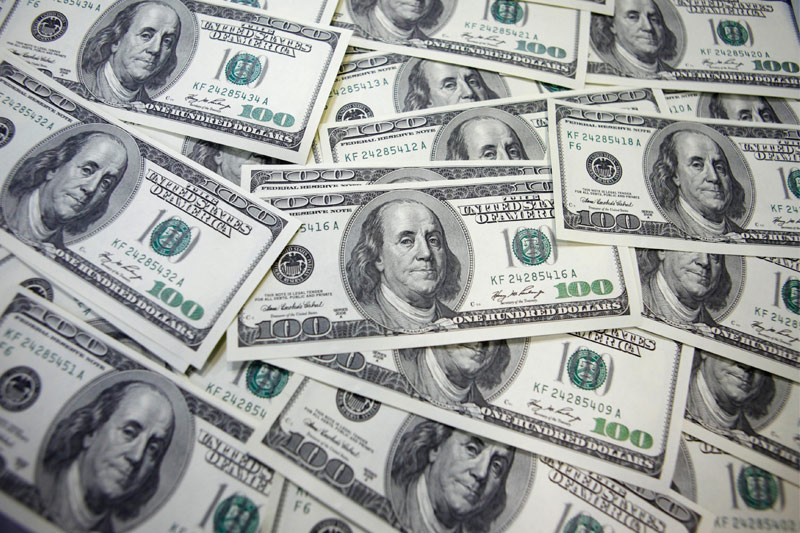Investing.com - The U.S. dollar was broadly lower against the other major currencies on Friday, as markets awaited the release of a key U.S. jobs report later in the day for confirmation that the Federal Reserve will begin tapering its stimulus program this month.
During European morning trade, the dollar was steady against the euro, with EUR/USD easing up 0.06% to 1.3128.
The euro remained under pressure after European Central Bank President Mario Draghi on Thursday said the central bank's monetary policy will remain accomodative for as long as necessary and that interest rates should remain at present or lower levels for an extended period of time.
Official data on Friday showed that Germany's trade surplus narrowed unexpectedly to EUR14.5 billion in July, from an upwardly revised surplus of EUR15.8 billion the previous month. Analysts had expected the trade surplus to expand to EUR16.1 billion in July.
The greenback edged higher against the pound, with GBP/USD slipping 0.09% to 1.5576.
Official data showed that U.K. manufacturing production rose 0.2% in July, confounding expectations for a 0.3% rise, after an upwardly revised 2% increase the previous month.
A separate report showed that the U.K. trade deficit widened to GBP9.85 billion in July, from a dwonwardly revised deficit of GBP8.17 billion the previous month. Analysts had expected the trade deficit to narrow to GBP8.15 billion in July.
In addition, the Bank of England said that inflation expectations for the third quarter ticked down to 3.2% from 3.6%. in the three months to June.
Data also showed that U.K house prices rose less-than-expected in August, ticking up 0.4% after a 0.9% increase the previous month. Analysts had expected house prices to rise 0.7% last month.
Elsewhere, the greenback was lower against the yen and the Swiss franc, with USD/JPY retreating 0.44% to trade at 99.66, and with USD/CHF falling 0.12% to 0.9439.
In Switzerland, official data earlier showed that consumer price inflation slipped 0.01% last month, compared to expectations for a flat reading, after a 0.4% fall in July.
The greenback was broadly lower against its Canadian, Australian and New Zealand counterparts, with USD/CAD sliding 0.44% to 1.0458, AUD/USD adding 0.21% to 0.9141 and NZD/USD climbing 0.70% to 0.7939.
The dollar index, which tracks the performance of the greenback versus a basket of six other major currencies, was down 0.17% to 82.54.
Concerns over a U.S. military intervention against Syria’s government persisted, as the U.S. government was set to vote next week on President Barack Obama's proposal to launch a missile strike.
At a meeting in Russia, world leaders from the Group of 20 nations put pressure on President Obama to decide against launching military strikes in Syria, which many of them fear would hurt the global economy and push up oil prices.
Later in the day, the U.S. was to release government data on nonfarm payrolls and the unemployment rate.
During European morning trade, the dollar was steady against the euro, with EUR/USD easing up 0.06% to 1.3128.
The euro remained under pressure after European Central Bank President Mario Draghi on Thursday said the central bank's monetary policy will remain accomodative for as long as necessary and that interest rates should remain at present or lower levels for an extended period of time.
Official data on Friday showed that Germany's trade surplus narrowed unexpectedly to EUR14.5 billion in July, from an upwardly revised surplus of EUR15.8 billion the previous month. Analysts had expected the trade surplus to expand to EUR16.1 billion in July.
The greenback edged higher against the pound, with GBP/USD slipping 0.09% to 1.5576.
Official data showed that U.K. manufacturing production rose 0.2% in July, confounding expectations for a 0.3% rise, after an upwardly revised 2% increase the previous month.
A separate report showed that the U.K. trade deficit widened to GBP9.85 billion in July, from a dwonwardly revised deficit of GBP8.17 billion the previous month. Analysts had expected the trade deficit to narrow to GBP8.15 billion in July.
In addition, the Bank of England said that inflation expectations for the third quarter ticked down to 3.2% from 3.6%. in the three months to June.
Data also showed that U.K house prices rose less-than-expected in August, ticking up 0.4% after a 0.9% increase the previous month. Analysts had expected house prices to rise 0.7% last month.
Elsewhere, the greenback was lower against the yen and the Swiss franc, with USD/JPY retreating 0.44% to trade at 99.66, and with USD/CHF falling 0.12% to 0.9439.
In Switzerland, official data earlier showed that consumer price inflation slipped 0.01% last month, compared to expectations for a flat reading, after a 0.4% fall in July.
The greenback was broadly lower against its Canadian, Australian and New Zealand counterparts, with USD/CAD sliding 0.44% to 1.0458, AUD/USD adding 0.21% to 0.9141 and NZD/USD climbing 0.70% to 0.7939.
The dollar index, which tracks the performance of the greenback versus a basket of six other major currencies, was down 0.17% to 82.54.
Concerns over a U.S. military intervention against Syria’s government persisted, as the U.S. government was set to vote next week on President Barack Obama's proposal to launch a missile strike.
At a meeting in Russia, world leaders from the Group of 20 nations put pressure on President Obama to decide against launching military strikes in Syria, which many of them fear would hurt the global economy and push up oil prices.
Later in the day, the U.S. was to release government data on nonfarm payrolls and the unemployment rate.
